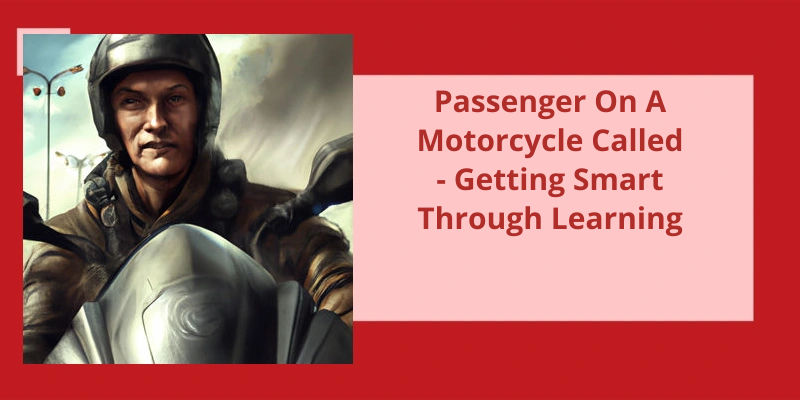In a world driven by constant technological advancements and rapid change, the pursuit of knowledge has become more critical than ever before. Every individual, metaphorically speaking, finds themselves as a passenger on a motorcycle called life, striving to keep up with the fast-paced journey of learning. Whether it be acquiring new skills, embracing new perspectives, or delving into unexplored ideas, the path to intellectual growth becomes a catalyst for personal and professional development. This blog article, titled "Passenger On A Motorcycle Called – Getting Smart Through Learning," encapsulates the significance of continuous learning in an ever-evolving world. It explores the strategies and approaches one can adopt to navigate this exhilarating ride effectively, enabling them to make informed decisions, adapt to new challenges, and ultimately thrive in a knowledge-driven society. From harnessing the power of online resources to seeking out diverse learning opportunities, this article serves as a guide for individuals determined to embark on a journey of intellectual enlightenment. Join us as we explore the transformative power of learning and embark on a journey that promises to enhance our understanding, sharpen our skills, and unlock the boundless possibilities that await us.
Why Could Carrying a Passenger on a Motorcycle Cause Problems?
Carrying a passenger on a motorcycle can potentially cause problems due to the significant impact it’s on the bikes dynamics. As a back-seat rider, your performance and behavior directly affect how well the motorcycle handles, turns, and stops. It’s crucial for both you and the rider to be adequately prepared prior to riding to ensure a safe and enjoyable experience.
One of the main problems that may arise from carrying a passenger is the added weight and balance factor. The extra weight can affect the bikes stability and handling, particularly during turns and sudden maneuvers. The rider must be aware of this and adjust their riding technique accordingly to accommodate the change in dynamics.
Another issue that can arise is the potential for the passengers movements to throw off the bikes balance. If the passenger suddenly shifts their weight or makes sudden movements, it can significantly affect the stability of the motorcycle. This is why it’s essential for the passenger to be knowledgeable about proper riding etiquette and to communicate effectively with the rider to ensure smooth coordination.
Furthermore, the passenger must also be aware of the potential dangers and risks involved in motorcycle riding. They should be properly dressed in protective gear and understand the importance of maintaining a safe distance from hot or moving parts of the bike. It’s crucial for them to follow the riders instructions and avoid any unnecessary distractions or actions that may compromise the safety of both themselves and the rider.
Proper preparation and communication between the rider and passenger are crucial to ensure a safe and enjoyable experience. Both parties should be knowledgeable about riding etiquette, dressed in protective gear, and aware of the potential risks involved. Additionally, increased braking distance and attentiveness are essential for maintaining safety on the road.
As riders hit the open road, they embark on a journey that goes beyond the physical act of riding. The psychology of riding a motorcycle involves a complex interplay of emotions, sensations, and social connections. It’s an experience that fosters a strong sense of camaraderie and belonging, creating an intricate tapestry of emotions that contribute to a rider’s overall well-being.
What Is the Psychology of Riding a Motorcycle?
What’s the psychology of riding a motorcycle? Motorcycling often breeds a strong sense of community, a connection that goes beyond the mere act of riding. It’s an exhilarating experience, a rush of adrenaline and freedom that taps into our primal instincts. When we ride a motorcycle, we become one with the machine, our senses heightened, our focus solely on the present moment. This intense focus on the road and the surroundings brings a sense of clarity and mindfulness, allowing us to tune out the noise of everyday life and be fully present in the moment.
This sense of presence and mindfulness isn’t only beneficial for our mental well-being but also for our physical health. Riding a motorcycle requires concentration, coordination, and quick thinking, which helps to improve cognitive abilities and sharpen our reflexes. The constant need to scan the road for potential dangers keeps our minds sharp and alert, enhancing our overall cognitive function.
When we see a fellow rider on the road, we feel a sense of connection and kinship, a recognition of shared passion and experience. These encounters, even if brief, can create a sense of belongingness and acceptance, boosting our self-esteem and social confidence.
Additionally, the camaraderie of a motorcycle club or the shared stories at bike rallies provide opportunities for social interactions and emotional support. Whether were swapping tales of our latest adventures or lending a helping hand to a fellow rider in need, these shared experiences create bonds of friendship and companionship that are deeply satisfying on a psychological level. Being part of a community that understands and appreciates the freedom, exhilaration, and challenges of riding a motorcycle can give us a sense of purpose and fulfillment.
It taps into our primal instincts, enhances our mental and physical well-being, and fosters a sense of community and belongingness. So the next time you hop on a motorcycle, remember that youre not just embarking on a thrilling adventure, but also embracing a deeper connection with yourself and the world around you.
The Psychological Impact of Risk-Taking in Motorcycle Riding
Risk-taking in motorcycle riding can have a significant psychological impact on the rider. The thrill and adrenaline rush associated with taking risks can create a sense of empowerment and invincibility. However, it also exposes them to potential danger and harm.
The fear of accidents and injuries can cause anxiety and stress in riders, leading to increased hypervigilance on the road. Additionally, the constant need to assess and navigate potential hazards requires heightened focus and concentration, which can be mentally exhausting.
Furthermore, riders may experience a spectrum of emotions, ranging from excitement and euphoria to fear and apprehension. The unpredictable nature of riding, combined with the inherent risks involved, can trigger intense emotions that impact the rider’s mental well-being.
Over time, repeated exposure to risk-taking behavior can also desensitize riders to the potential consequences. This can lead to a diminished perception of danger and an increased willingness to take even greater risks. This psychological shift can be attributed to the concept of risk compensation.
In conclusion, the psychological impact of risk-taking in motorcycle riding encompasses a range of emotions, heightened vigilance, and potential desensitization to danger. Understanding these impacts is crucial for riders to make informed decisions and prioritize their safety while enjoying the thrill of riding.
Conclusion
In conclusion, becoming a passenger on the motorcycle called "getting smart through learning" is an invigorating and transformative journey. By embracing the role of a learner, we open ourselves up to endless possibilities for growth and development. Through curiosity, perseverance, and self-reflection, we’re able to navigate the winding roads of knowledge, gaining valuable insights along the way. Learning becomes more than just acquiring information; it becomes a way of life, a means to expand our horizons and unlock our true potential. As we ride alongside our teachers, mentors, and fellow learners, we not only gain intellectual intelligence but also cultivate emotional intelligence, critical thinking skills, and a deeper understanding of the world around us. So let’s embark on this thrilling adventure, forever discovering, challenging, and reinventing ourselves as passengers on the motorcycle of lifelong learning.






